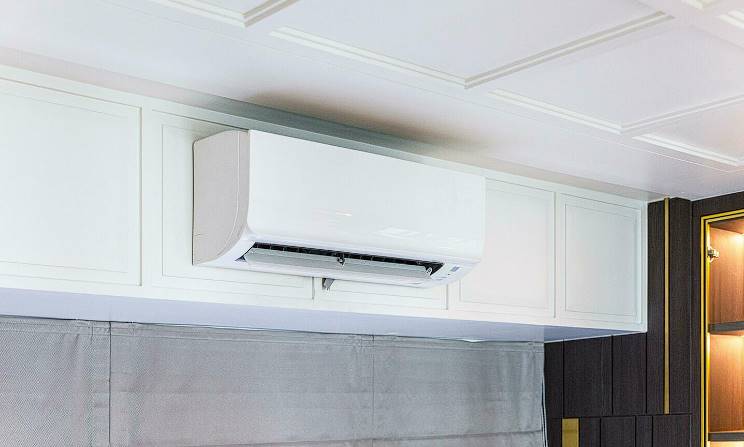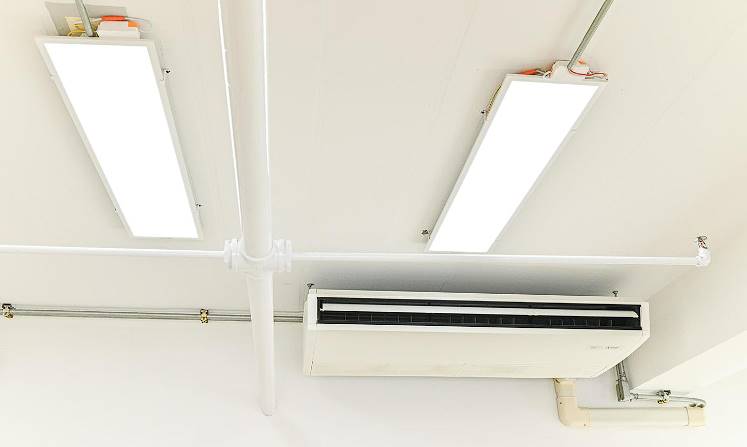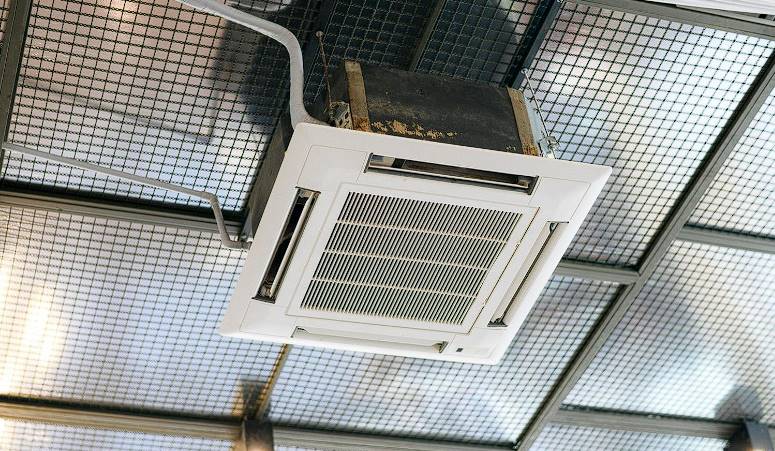Air conditioners have grown ubiquitous in our homes and offices as we strive for year-round comfort. Despite the comfortingly low temperatures they produce, concerns have been raised regarding how they may affect the quality of the air we breathe at home.
This in-depth manual aims to clarify the complicated dynamic between air conditioners and indoor air quality by illuminating the ways in which air conditioners may be helpful tools and can contribute to air quality issues.
Understanding the complexities of this link reveals that air conditioners serve a dual purpose. On the one hand, they protect us from the outside world's allergies and toxins by filtering and recirculating the air we breathe.
On the other hand, the very operation of air conditioning systems creates particular issues, such as the possible formation of mould and the movement of airborne particles within enclosed areas.
The aspects affecting indoor air quality are investigated in depth, from the air conditioner's make and model to its upkeep procedures and the filters it uses. Here, we break down the technical lingo of heating, ventilation, and air conditioning (HVAC) systems and offer concrete advice for improving the quality of your home's indoor air.
In this enlightening excursion, we'll take a closer look at the complex relationship between HVAC systems and indoor air quality. Prepare yourself with insight as we delve into real-world strategies for striking the ideal equilibrium between a cosy environment and a healthy dose of outside air. We're here to help you create the perfect interior environment for relaxation and rejuvenation.
How Your Air Conditioner Can Improve the Indoor Environment.
In the warmest months of the year, air conditioning systems are crucial for making interior spaces habitable. However, you may not be aware of the crucial impact they may play in improving the quality of air within the home.
In this article, we'll discuss how AC units may help increase the quality of the air inside your home, making it safer and more comfortable for you and your loved ones to spend time there.
AC and Indoor Air Quality
Although its primary purpose is to provide thermal comfort, air conditioning also indirectly influences indoor air quality. Regularly serviced air conditioning systems may significantly cut down on indoor air pollution, making the space inside much more pleasant and healthier to be in.
Indoor air quality might decline without regular HVAC system maintenance and the installation of an air purifier. You may ultimately suffer from air conditioning pollution, whereby your AC constantly circulates low-quality air.
Advantages of Air Conditioning Filtration Systems
Pet dander, dust, pollen, and other airborne particles are easily captured by the air filters included in today's air conditioning systems. The presence of allergens and contaminants in the air is reduced thanks to these filters. However, as was previously said, this does not imply that air conditioning systems serve the same function as air filtration systems or have the same impact.
Adding an ioniser to your air conditioner improves air quality by introducing negative ions, increasing the efficiency of the air conditioner's filtering system. Keep in mind that the main goal of the air conditioner is to control the ambient temperature.
Some air purifiers release hydrogen peroxide into the air, while others utilise high-efficiency particulate air (HEPA) filters to remove harmful substances from the air in a room.
The Importance Of Regular AC Filter Replacement
Maintaining a consistent filter replacement schedule is essential for ensuring the air conditioner continues to improve indoor air quality. When filters are clean, they allow for maximum airflow and filtering.
Professional maintenance keeps your system running smoothly and fresh air flowing through your home all year long. If you want to live in a healthy atmosphere, make sure your air conditioner is in good working order.
Do Air Conditioners Improve Indoor Air Quality?
When temperatures rise, many people in the world choose to switch on their air conditioners. There are numerous myths regarding how it affects indoor air quality and health despite being a common fixture in today's homes. Let's put some of these urban legends to rest:
Air Conditioners Bring Fresh, Cool Outdoor Air Indoors.
Air conditioners never suck in outside air and recirculate it inside. Air conditioners work by reusing the air from within a building. Through the system's compressor and condenser, a coolant is transformed into a cold liquid while hot air is expelled. As the cold air is brought back into space, the temperature and humidity drop.
In the warmer months, your air conditioner might be the cause of your constant cold and cough. Surely, you've heard what happens if you rush outdoors when the air conditioner is on and then come back inside.
Moving from a warm outdoor environment to a chilly inside environment is not the cause of catching a cold or cough; rather, it is the airborne viruses themselves.
Indoor air pollution is five to ten times higher than outside pollution. Air pollutants including cigarette smoke, dust, mould, and pet dander, are likely to blame when you feel a tickle in your throat or suffer an allergy attack.
Regular Cleaning and Filter Replacement Are Not Necessary for Air Conditioners.
Regular house cleaning should not lead you to neglect the air conditioner's regular maintenance and cleaning. Remember that your air conditioner is recycling air that has already been contaminated by indoor contaminants.
Your air conditioner might end up collecting some of those toxins. Filters can clog up with dust and mould and mildew can spread via ducts and coils that haven't been cleaned in a while.
Your Air Conditioner Is The Only IAQ Tool You Need At Home
The primary function of your air conditioner is to maintain a healthy temperature and relative humidity within your house. The air quality will not be improved so that people may breathe easier.
Air conditioners with purification systems assist in filtering certain indoor air contaminants, but they cannot eliminate them entirely. Air conditioning, when utilised and maintained properly, may be an effective tool for improving house IAQ. If you don't, it might have a detrimental impact on the quality of air within your home.
When Is Your AC Doing More Harm Than Good?
If you get unwell or have an asthma or allergy attack when the air conditioner is running indoors, there may be a lot of contaminants in the air. If your air conditioner is always running, it will blast chilly, dry air, which might irritate your skin. Eye and nose irritation, as well as headaches and sinus congestion, are all possible side effects of extreme dryness.
Why Should I Care About Clean Air at Home?
People's health and happiness may be negatively impacted by contaminants found within buildings. Short-term exposure to pollution can make us sick with coughing, sneezing, eye discomfort, exhaustion, and nausea. Pollutants in the air can make someone's existing illness, like asthma, worse.
Long-term exposure to indoor air pollution has been linked to cancers of the lungs, heart disease, and the respiratory system. Maintaining our health today and in the future requires that we give serious consideration to the air quality within our homes and places of work.
What Is Good Quality Air?
The degree to which air is clean or contaminated is referred to as air quality. The health benefits of breathing in clean, pollution-free air are well-documented. Commonly, the first thing that comes to mind when people hear the phrase "poor air quality" is images of polluted outdoor air caused by the release of chemicals from industries. Yet another serious threat to public health is that posed by subpar indoor air quality. After all, most of us are inside creatures by nature.
What Causes Indoor Air Pollution?
Numerous air contaminants pose serious threats to human health. The following are examples of typical indoor pollutants:
Carbon Monoxide (Co)
Carbon monoxide is an invisible, odourless gas that requires special equipment to detect. Smoke from cigarettes, wood fires, and unvented gas heaters are all potential sources. Low concentrations can induce flu-like symptoms in addition to dizziness and headaches. Extreme amounts are lethal.
Nitrogen Dioxide (No2)
Inflammation of the airways and an increase in asthma symptoms have been linked to exposure to high levels of nitrogen dioxide. Tobacco smoke, gas stoves and ovens, and car exhaust are just a few of the contributors of indoor air pollution.
Mould Spores
Mould, a fungus, thrives in damp environments like those found in the bathroom, laundry room, and kitchen. Inhalation of airborne mould spores has been linked to a variety of health issues.
Dust And Pet Dander
When microscopic particles of a solid or liquid contaminant are released into the air, this is known as particle pollution. Dust mites, cat dander, and pollen are just a few examples. Their impact on human health can run the gamut from minor irritations to life-threatening infections.
How to Improve Indoor Air Quality?
Improve Ventilation
If you want to reduce the amount of pollutants in your house, you should have fresh air constantly brought in. You may boost ventilation inside by opening windows, turning on fans, and running the air conditioner.
Choose Natural Cleaners
VOC levels can rise if you use chemical-based cleaners and air fresheners around the house. Instead of using them, try organic, natural cleaners.
Prevent Mold Build-Up
Anywhere there is a lot of moisture or humidity, mould can grow. Be sure to activate the bathroom exhaust fan whenever you enter the room. Maintain a weekly shower cleaning routine and a weekly towel washing routine.
Clean Often
Establish a routine of constant housekeeping. Make careful to vacuum away any dust or pet dander that may have accumulated, instead of using a feather duster, which can spread the dust about the room, wipe off dirty surfaces with a microfiber cloth.
Use A Dehumidifier
Use a dehumidifier if you have difficulties maintaining your house at healthy humidity levels, which may prevent issues like mould and mildew.
Decorate With Houseplants
Indoor air quality may be improved by just having houseplants around. Some plants, including benzene, formaldehyde, and trichloroethylene, are excellent at removing toxins from the air, in addition to providing oxygen.
Use Your Air Conditioner
Air conditioners that are properly maintained remove contaminants from the air and replace it with cool, dry air, making a noticeable difference in the quality of air in both the home and the office. Read on for advice on how to make the most of your air conditioner in the fight against unhealthy indoor air.
Conclusion
Air fans are very important for keeping the air inside clean, keeping you cool, and lowering the amount of pollution inside. They clean and recycle air, which keeps us safe from allergens and toxins but also causes problems like mould growth and the movement of airborne particles. If you want to make your home comfy and healthy, you need to know how air conditioners affect the quality of the air inside.
Air conditioners can make the air inside better by removing allergens and contaminants like pet hair, dust, pollen, and other particles in the air. On the other hand, air cooling systems and air filtration systems do not do the same thing or have the same effect.
By adding negative ions and making the cleaning system work better, an ioniser can improve the air quality better in an air conditioner. A few air purifiers use high-efficiency particulate air (HEPA) screens to get rid of harmful things in the air, while others use hydrogen peroxide.
Making sure you change the filters on a regular basis is important to make sure the air conditioner keeps improving the quality of the air inside your home. All year long, the system stays in good shape with professional care, which keeps the air moving through the house.
But some people have the wrong idea about how air units change the quality of the air inside. Air fans bring cool, fresh air from outside inside, but they can also spread viruses that can make you sick. Five to ten times more pollution is in the air inside than outside, and things like dust, mould, cigarette smoke, and pet dander can make it hard to breathe.
Air coolers don't need to be cleaned or replaced with filters on a regular basis because they recycle air that has been contaminated by things inside. Some indoor air pollutants can be filtered out by air units with purification systems, but they can't be completely removed. When used and taken care of properly, air conditioning can help improve the Indoor Air Quality (IAQ) of a home.
Short-term exposure to pollution can make people cough, sneeze, have eye pain, feel tired, and feel sick. Having clean air at home is important for their health and happiness. Being inside for a long time and breathing in dirty air has been linked to lung cancer, heart disease, and problems with the respiratory system.
How clean or dirty the air is determines how good the air quality is. Carbon monoxide (Co), nitrogen dioxide (No2), mould spores, dust mites, cat dander, and pollen are all common indoor pollutants.
To make the air inside your home better, open the windows, turn on the fans, and run the air conditioner. Instead of chemical-based air fresheners and cleaners, use natural ones. To stop mould growth, turn on the bathroom exhaust fan, clean often, use a dehumidifier, and decorate with flowers.
Air conditioners that are well taken care of clear pollutants from the air and replace them with cool, dry air. This makes a big difference in the quality of the air in your home or office.
Content Summary
- Air conditioners play a dual role in filtering air and potentially circulating pollutants.
- Understanding HVAC systems is key to improving indoor air quality.
- Air conditioners can filter out allergens and toxins from indoor air.
- The operation of ACs can lead to mould formation and airborne particle circulation.
- Regular servicing of air conditioning systems reduces indoor air pollution.
- Without maintenance, ACs can circulate low-quality air, causing pollution.
- Air conditioning filtration systems capture pet dander, dust, and pollen.
- Adding an ioniser to ACs can enhance air quality by releasing negative ions.
- Regular AC filter replacement ensures maximum airflow and filtration.
- Air conditioners recycle indoor air, not bring in fresh outdoor air.
- Indoor air pollution can be higher than outdoor pollution.
- Regular cleaning and maintenance of ACs are essential for quality air circulation.
- ACs alone are not sufficient tools for complete indoor air quality (IAQ) management.
- Continuously running ACs can lead to dry air, causing irritation and discomfort.
- Contaminants inside buildings can impact health and well-being.
- Short-term exposure to indoor pollution can cause various health issues.
- Long-term exposure to indoor air pollution is linked to serious diseases.
- Good air quality refers to clean, pollution-free air.
- Indoor air pollution can be as harmful as outdoor pollution.
- Carbon monoxide is a harmful indoor pollutant from various sources.
- Nitrogen dioxide indoors can cause respiratory issues.
- Mould spores in damp areas can lead to health problems.
- Dust and pet dander are common indoor pollutants affecting health.
- Improve ventilation to reduce indoor pollutants.
- Use natural cleaners to lower volatile organic compounds (VOCs) indoors.
- Prevent mould build-up in moisture-prone areas.
- Regular cleaning helps reduce dust and allergen accumulation.
- Dehumidifiers can prevent mould and mildew in humid environments.
- Houseplants can improve indoor air quality by removing toxins.
- Properly maintained ACs significantly improve indoor air quality.
- ACs expel hot air and circulate cooled indoor air.
- Air conditioners do not directly cause colds or coughs.
- Ignoring AC maintenance can lead to the spread of pollutants.
- ACs need regular filter cleaning and replacement.
- Air conditioning is not the only solution for IAQ improvement.
- A constantly running AC can exacerbate asthma or allergy symptoms.
- Clean air at home is vital for long-term health and wellness.
- Exposure to CO can lead to symptoms similar to flu.
- NO2 from indoor sources can aggravate asthma.
- Mould thrives in humid indoor environments and affects air quality.
- Particle pollution from pets and dust can cause health issues.
- Opening windows and using fans can improve home ventilation.
- Chemical-based cleaners can increase indoor air pollution.
- Consistent house cleaning reduces dust and improves air quality.
- Houseplants act as natural air purifiers in indoor spaces.
- ACs should be part of a broader strategy for managing IAQ.
- ACs need to be properly set and maintained for effective air purification.
- Correct usage of ACs can alleviate symptoms of poor air quality.
- Monitoring humidity levels is important for indoor air quality.
- Understanding and managing ACs are crucial for maintaining good indoor air quality.
Frequently Asked Questions
Mould development is facilitated by poorly maintained air conditioners. Mould may develop in damp, dirty areas like evaporator coils and drip pans.
Depending on the type of filter and the frequency with which it is used, air filters should be cleaned or replaced every one to three months. By keeping up with frequent checks, you can ensure the greatest possible filtration and improved indoor air quality.
Central air conditioners can help get rid of unpleasant odours by recirculating and filtering the air in a space. However, further measures may be required to get rid of remaining smells.
Air conditioners may be a source of indoor air pollution if they do not have adequate filters to prevent particles like dust and pollen from entering the home from the outside. This danger can be lessened with the use of good filters.
Reduced mould and mildew growth is one benefit of having an air conditioner. The quality of indoor air and the comfort of those within may both be improved by keeping humidity levels where they should be.



